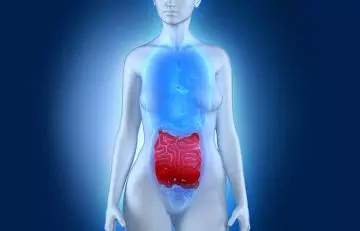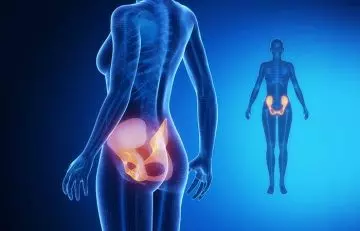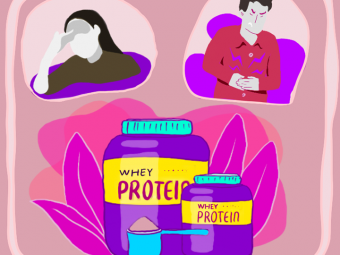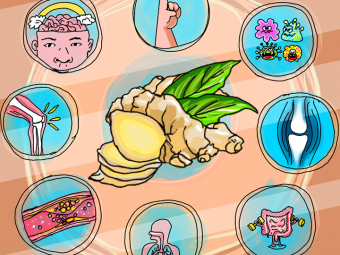This Is Why So Many Women Suffer From Chronic Bloating
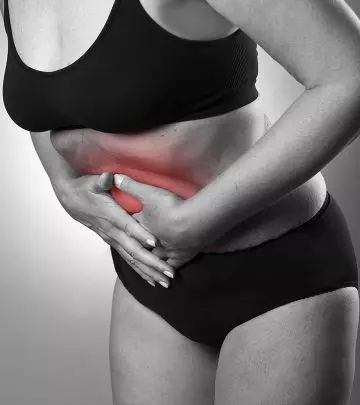
Image: shutterstock
Having a pseudo-pregnant belly is the worst! Especially when people start thinking that’s a real baby bump and begin congratulating you. You can’t help but facepalm and clear the rather awkward air embarrassingly. You find yourself saying rather meekly, “Oh I just ate too much, that’s all.”
Seriously, chronic bloating is so common among women right now that sometimes even we start rubbing our bellies fondly. Well, I know I do it – guilty as charged! Nonetheless, the big question is- what causes this abomination? Is it really overeating? Or is it the result of drinking one too many glasses of wine without having enough water?
If you, like me, have always wanted to know the reason behind bloating, you’ve come to the right place. Bloating, defined as a swelling in the abdominal area, is caused by multiple reasons according to Washington, DC-based Dr. Robynne Chutkan, a leading gastroenterologist as well as the founder of the wellness center, Digestive Centre for Women.
In her book, The Bloat Cure, she goes on to explain that the prime cause of women being more bloated more often than men is because they tend to possess larger intestines (1). And that’s completely plausible as on an average, the size of a woman’s colon exceeds that of a man by 10 cm, which helps in the absorption of fluids when a woman is pregnant (2).
Upon the reasons for a longer colon, Chutkan explains, “Because you have to keep the amniotic fluid replete, and the circulation and blood volume increases during pregnancy.”
But that’s not all. Chutkan points out that chronic bloating is an issue for women because their extra long colons give rise to a sort of redundancy as they’re forced to take more twists and turns than those of men, which leads to constipation and bloating.
Hmm. So that explains one reason why bloating is such a problem among women. What about the other reasons? Let’s find out!
1. Shape Of The Pelvis
Chutkan also mentioned that not only is a woman’s colon larger, but they also have differently shaped pelvises as compared to men (3). Your pelvis is a round one. Because of its round shape, and due to the fact that the space above the pelvis is occupied by your ovaries, uterus and also the fallopian tubes, a large section of your colon falls into your pelvis. What this means is that you’re naturally made to experience chronic bloating as sad as that may sound.
2. PMS Or Pre-Menstrual Syndrome
When Aunt Flo comes visiting, she makes sure to bring with her a lot of discomfort for you. And you can feel a lot of that discomfort even before she’s arrived! PMS generally starts 5 to 11 days prior to the onset of your next period, and manifests itself in many symptoms. Bloating is one of those symptoms (4).
However, despite causing a lot of grief, this specific kind of bloating has a silver lining too. You can completely control and even eliminate bloating caused by PMS! The cure lies in simple things such as hydrating more, consuming less salt, taking all of your vitamins, exercising regularly, and sleeping at least 8 hours.
3. IBS Or Irritable Bowel Syndrome
Just like PMS, IBS has quite a few symptoms too. Out of them, bloating is one of the predominant ones (5). Although uncomfortable, this disorder does not cause any damage to your intestines. IBS happens to be caused by a fall or rise in your intestinal contractions.
Regardless of that, both IBS and the bloating caused by it can be fixed with the help of certain medications that are commonly available over the counter. So be sure to consult your doctor regarding the medication that will suit you the best.
4. Cysts In The Ovary
Ovarian cysts are small sacs, filled with fluid that grow upon the surface of your ovaries. They are usually caused by disturbances in your hormonal balance, especially that particular hormone, which is responsible for releasing the egg every ovulation cycle (6).
If you’ve been diagnosed with ovarian cysts, you will experience bloating as a symptom as the cysts put pressure on your abdomen. Ovarian cysts can be controlled with the help of medication. However, if you condition is severe, you may need surgical intervention.
Now, these were women-centric causes of bloating. However, the following are more general reasons that could account for bloating:
5. Dehydration
When your body doesn’t get the daily dose of water it requires, it desperately tries to retain the water it has, and that leads to the feeling of bloating.
6. Constipation
If you’re unable to release stool due to constipation, it will remain stored in your intestine, creating abdominal pressure and leading to bloating (7).
Apart from the above, stomach bugs and infections can also lead to a swollen belly. Now that you know all the causes, you stand in a better position when it comes to treatment options. If your bloating is chronic, it’s time to call up your doctor and get things in control.

